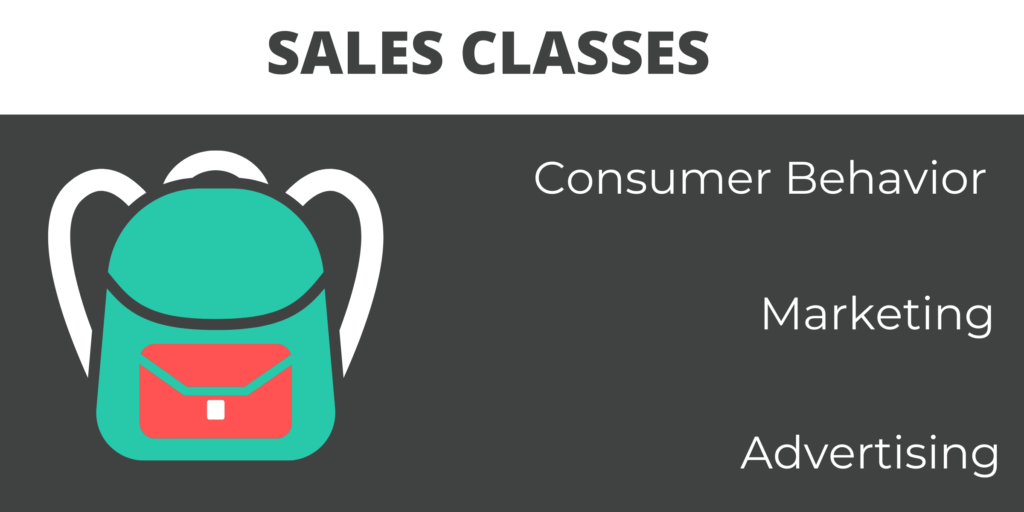So you think you want to work in sales? There’s a bit of sales in nearly every role. Depending on what your work is, you’ll undoubtedly need to pitch an idea for a solution to a superior or budget keeper. If you work in marketing, your job is essentially automating sales. If you work in a tech position, you need to connect the diverse and distinct needs of your tech product users to your service.
But for a select few, the calling is to sales itself. Sales can be a highly lucrative career. And members of sales advance in a given industry tend to become subject matter experts in their own right.
If you’re interested in sales, the good news is that you can typically enter a sales position from many different backgrounds. Individuals in sales may have a liberal arts degree, a law degree, a science degree, and the list goes on. To truly advance in the field, however, many individuals do turn to one of the most recognized degrees in business: a business administration degree. In particular a master’s in business administration. More generally, business degrees may also offer sales concentrations. But a degree in “sales” alone is relatively uncommon. Thus this guide! Below we’ll look at some of the most common paths into sales as well as the degrees that can help you advance the furthest.
Table of Contents:
- What Degree Do I Need To Get Started in Sales?
- What Degree Do I Need To Advance in Sales?
- The Most Lucrative Sales Positions
Not seeing what you’re looking for? Be sure to check out related content on GreatBusinessSchools below:
- What Can I Do With an Associates in Business Degree?
- What Can I Do with a Bachelor’s Degree in Business?
- What Can I Do with a Real Estate Degree?
- What Can I Do with a Bachelor’s in Marketing?
- What Can I Do With a Communications Degree?
- What Can I Do with a Degree in Project Management?
- What Can I Do With a Marketing Degree?
- What Can I Do With a Marketing MBA?
- What Can I Do With a Master’s in Marketing?
- The 10 Best Online Marketing MBAs
- The 10 Best Online Masters in Communication Degree Programs
- The 10 Best Online Master’s in Marketing Degree Programs
- The 20 Best Online Bachelors in Business Administration Degree Programs
- The 50 Best Business Schools in North America
- The Best Online Real Estate MBA Degree Programs
What Degree Do I Need To Get Started in Sales?
Entry level sales positions require a few things:
- The ability to be personable
- The ability to be articulate
- A basic level of professionalization (proper attire, showing up for meetings on time)
- An understanding of the subject matter surrounding the products you’ll be selling
The first two of these requirements can typically be acquired through almost any associates or bachelor’s degree. You should, by graduation, have experience articulating your thoughts, regularly writing to get your point of view across, and working with individuals to get things done. The level of professionalization needed for an entry-level sales position should include things you’ve picked up in school or if you haven’t a career services department can help to point you in the right direction. Sales is about instilling confidence and professionalism around your product, so even though this is a “soft” skill, it’s important to get right.

Due to the prevalence of being articulate, learning the needs of the client, and being good at communications, many degrees such as the following can be good preparation for sales careers (even if they don’t directly tackle sales related topics):
- Humanities
- Social Sciences
- Communications
- Marketing
- Pre-Law
If you’re looking to focus less on communication and “all around” education and more on business-specific learnings, you could do well to study one of the following:
- Business Administration
- Management
- Marketing
- Real Estate
- Sales (where available)
Finally, the subject matter surrounding the products you’ll be selling can be gained in a few ways. If you know in advance that you may want to go into a particular area of sales, you may want to pursue some coursework related to whatever this product is. For example, a great degree for an individual wanting to get into pharmaceutical sales would be biomedical engineering, or biology, or taking a pre-med track. To get into enterprise software-as-a-service sales, you may very well want to minor in a computing discipline, or take a business concentration major in an information science discipline.
Degrees that complement sales with subject-specific knowledge are wide ranging, but may include the following:
- Real Estate
- Insurance
- Health Services
- Biomedical Engineering
- Biology
- Chemical Engineering
- Computing fields
Regarding what degree level you will need, typically no more than a bachelor’s degree is required to get started in sales. And in some fields no formal collegiate education is required (though it may be helpful).

Within two fields in particular, additional licensure requirements will be needed. These include:
- Insurance Sales
- And Real Estate Sales
Some degree programs particularly at the associates and bachelors levels build in training for these licensures.
Here at Greatbusinessschools we’ve covered a wide range of degree types that can lead to an entry-level sales position. Some of our more pertinent related content includes:
- 10 Best Real Estate Certificate Programs for 2020
- 15 Best Online Real Estate Degrees for 2020
- 10 Fastest Online MBA Degree Programs for 2020
- 10 Most Affordable Business Bachelor’s Degrees for 2020
What Degree Do I Need To Advance in Sales?

As we looked at in the prior section, there are many, many degrees with which you can get started in sales. Really the only restrictions occur in fields where some technical knowledge is needed, or some licensure is needed (as is the case in insurance and real estate).
But as you gain your footing in sales, you may well find that obtaining greater knowledge about the best practices, management of teams, and broader industry in which you work may be helpful. In certain larger organizations, simply having a graduate degree in management may open doors for advancement (or be a requirement).
Among the degrees best suited to help you advance in sales, the following stand out:
- Masters in Business Administration
- Master’s in Real Estate
- Master’s in Sales Management
- Master’s in Commercial Management
The most common of these degrees populates a majority of the board rooms of the largest companies in America. Masters in Business Administration degrees are the most well-recognized degree for “getting ahead” in business, and offer more routes than ever to support your professional advancement.
The things you’ll want to consider when pursuing a master’s in business administration include:
- Time investment
- Money investment
- Whether to go general or specific
The time investment of an MBA can vary widely. Full-time in-person programs typically require individuals to be full-time students, and aren’t the best option for individuals who also want to keep their day job. These programs, however, can sometimes be completed in less total time and in as little as a year and a half.
Part-time in-person programs have also been around for quite a while within MBAs. These programs typically meet in the evenings or on the weekends. They may require up to three years to complete.
Online programs can come in synchronous and asynchronous formats. Asynchronous programs allow you to largely choose when you attend class and schedule, though it is rare that you won’t have to coordinate your schedule at times with classmates or for testing. Synchronous programs occur online but have classes at set times.
Finally, executive MBAs can dramatically lower the time investment for an MBA. But these programs are meant for individuals who already have substantial experience in managerial roles. Executive MBAs assume that students already know many of the basics and can at times be completed in as little as a year with weekend classes.
Our second parameter for choosing a program includes how much the program will cost. A vast majority of MBA graduates end up making more money once they graduate from the program, but programs from some of the top schools in the nation can also be prohibitively expensive. Luckily, there tend to be MBA programs at nearly every price point, ranging from a few thousand dollars a year through over $100,000 a year. Federal student loan programs typically have less caps on the amount one can borrow to pursue a professional degree than lower degree levels and at last check students could borrow up to the full amount of the program cost.
Finally, most MBA programs today offer a general track (a traditional MBA) as well as specialization options. Some programs may offer up to 20 specializations, and if you know whether you want to directly specialize in sales or a related discipline, this can narrow down the schools you may with to apply to.

What courses will you take in an MBA?
MBAs give a general graduate overview of most major business and management fields, and then let students hone in on their interests in greater detail either through electives or a concentration. Some of the most common courses you’ll see in an MBA include:
- Graduate Statistics
- Finance
- Marketing
- Accounting
- Leadership
- Management
- Business Accountability or Ethics

Within a sales concentration, students are likely to select 2-4 courses that focus more directly on sales, these could include:
- Sales Analytics
- Building and nurturing relationships with clients
- Sales Leadership
If you’re interested in gaining information on a master’s in business administration degree, you’ll find a range of well-researched guides on the top schools in this area throughout Greatbusinessschools. A handful of our related academic degree rankings can be found below:
- The 50 Best MBA Programs in North America
- The Top 15 International Business MBA Programs In The World
- The 10 Most Affordable Online MBA Degree Programs
- The 15 Fastest Online MBA Degree Programs
- The 15 Best Online MBA Degree Programs
- The 25 Best On-Campus MBA Degree Programs
The second degree type that can help you advance your sales career (if you’re in real estate or related markets) is a master’s in real estate. As we’ve mentioned earlier in the guide, real estate is a decently regulated industry that requires individuals to uphold ethical, legal, and logistical understandings of the processes they’re overseeing. This is often in the form of a variety of real estate licensures one can acquire. Especially for high-end commercial real estate, lengthy contracts, negotiations, and regulations may come into play during sales or leases. This level of expertise is often only gained through years of experience or an advanced degree.
Courses included in master’s in real estate degrees vary but typically include:
- Real estate law
- Real estate markets
- Real estate ethics
- Real estate financing
- International real estate
- And construction management
If you’re looking for a high quality online master’s in real estate, be sure to check out our 2021 ranking on the best online master’s in real estate, today.

Additionally, real estate certifications can help one to stand out as an addition to a bachelor’s degree. Real estate certifications online are available as a way to gain specialized knowledge in the field. An online real estate certification is not meant to replace a bachelor degree, but instead make a resume standout even more. A real estate certificate program online is usually not time-consuming and may be finished in just a few short hours. More extensive online real estate certificates could require a multiple week commitment. If already employed by a real estate agency or brokerage, an online real estate program online has the potential to be paid for as part of required continuing education credits. Otherwise, free online real estate certificate programs are available.
Real estate certifications can be done through multiple websites, but should always come from an accredited school. As an example, Cornell University has a dedicated virtual campus with multiple programs in real estate. eCornell offers certifications in Hotel Real Estate Investments and Asset Management and Commercial Real Estate. Each online certificate program is broken down into six courses that are topic specific.
If you’re looking for a high quality online certificate in real estate, be sure to check out our 2021 ranking on the best online real estate certificates, today.
Master’s in Sales Management degree programs are not as widespread as master’s of business administration degrees with a sales focus, but follow a similar track with a master’s in management (MIM) degree. Oftentimes sales management degrees cover the same central topics available in many master’s in management, and then tack on 2-4 concentration courses on sales.
While offerings vary by program, a common curriculum of a sales management masters is likely to include the following courses:
- Marketing and sales strategy
- Innovation and consumers
- Product and business development strategy
- Comprehensive sales pipeline planning
- Digital transformation
If you’re looking for a master’s in management that offers a sales concentration, be sure to check out our 2021 ranking of the best online masters in management today!
The Most Lucrative Sales Positions
There are actually only a handful of positions at sales within companies. But there are many different industries that you can work in sales for. And some industries are much more lucrative than others.
Some of the most common sales roles include:
Account Executives (AE’s), who are responsible for servicing the needs of existing customers as well as closing deals with new customers. These individuals may focus on clients who have a certain use case, or are a certain size. For example, AE’s often focus on SMB (small to mid sized businesses), startups, large enterprises, or the public domain. Due to the unique needs of each one of these org types, AE’s can become specialists about what truly matters to each of these party types they interact with. AEs often earn a base salary as well as incentive pay. In many niches the incentive pay can be quite substantial if they’re closing large deals, and becomes a majority of earnings for that year.
Sales Development Representative (SDR’s) are often the member of sales who is the initial point of contact within a sales cycle. These individuals may reach out to prospects first, and their job is typically to understand whether the individual or organization is a good “fit” for becoming a prospect. If their needs align with the products or services being offered, then they often pass on their prospects to AEs, who work to seal the deal. SDR’s typically earn a base salary that averages around $50,000, that is supplemented by incentive pay built around how many solid leads they can develop.
Outside sales individuals tend to work outside of the office and may be on the road (or in the airport) much of the time. These members of sales are typically sent after the most high profile prospects and while their base salary is not the highest, they can often earn a percentage of large deals every time they close one.
Account managers are typically in charge of a team of account executives. These individuals are tasked with continuing to build relationships with existing clients, creating systems that bring more new clients in the door, and creating ideas about how products can become better. Account managers can earn over $100k a year in senior positions, but typically start closer to $60k.
Vice president of sales roles are typically the highest position one can achieve that is almost wholly centered around sales. You’re in charge of much of the company’s total revenue, and this is a role that is typically under a great deal of scrutiny. While base salary starts at an average of $118k for these roles, bonuses and stock options can easily double this.
While these are the most common roles within sales for many organizations, the largest determinant of earnings for any of these often depends on industry. Within some of the most lucrative industries to be in sales, account executive incentive pay can become several $100k’s a year through making a percentage of large deals. Noteworthy large commission sales industries include the following:
- Real estate
- Software as a service
- Most B2B sales
- Pharmaceutical Sales
Interested in learning more? Be sure to check out related content on GreatBusinessSchools below:
- What Can I Do With an Associates in Business Degree?
- What Can I Do with a Bachelor’s Degree in Business?
- What Can I Do with a Real Estate Degree?
- What Can I Do with a Bachelor’s in Marketing?
- What Can I Do With a Communications Degree?
- What Can I Do with a Degree in Project Management?
- What Can I Do With a Marketing Degree?
- What Can I Do With a Marketing MBA?
- What Can I Do With a Master’s in Marketing?
- The 10 Best Online Marketing MBAs
- The 10 Best Online Masters in Communication Degree Programs
- The 10 Best Online Master’s in Marketing Degree Programs
- The 20 Best Online Bachelors in Business Administration Degree Programs
- The 50 Best Business Schools in North America
- The Best Online Real Estate MBA Degree Programs
Carrie Morris
Author
Warren Dahl
Editor-in-Chief

